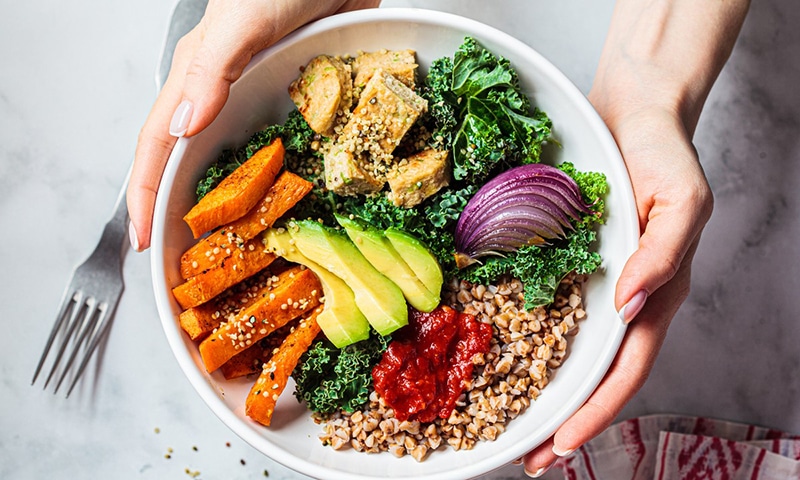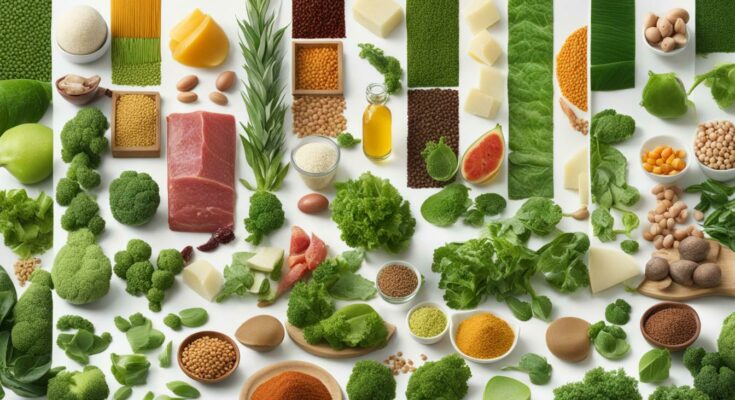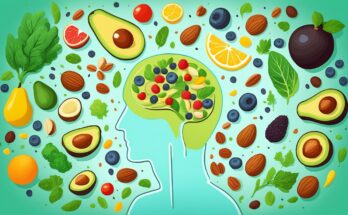As more and more people are making the shift towards plant-based diets, the question of whether plant protein is good or bad for one’s health has become a topic of debate. Some argue that plant protein lacks essential amino acids and therefore is less nutritionally complete than animal protein. Others believe that plant protein is just as healthy, if not better, than animal protein due to its high fiber content.
In this section, we will explore the topic of plant protein and its impact on our overall health and nutrition. We will examine the nutritional value of plant protein and how it compares to animal protein. We will also explore the various benefits and sources of plant protein, as well as its role in promoting a healthy diet.
Key Takeaways:
- Plant protein is a good source of essential amino acids, which are important for building and repairing tissues in the body.
- Plant protein is high in fiber, which can help to promote satiety and aid in weight management.
- Plant protein has been linked to a lower risk of heart disease and other chronic conditions.
- Plant protein can be found in a variety of sources, including legumes, nuts, seeds, and whole grains.
- Incorporating plant protein into a balanced diet can help to ensure that you are getting all the nutrients you need for optimal health and well-being.
The Benefits of Plant Protein
Plant protein is an excellent source of nutrition that offers numerous benefits for overall health and well-being. Unlike animal protein, which can be high in saturated fat and cholesterol, plant proteins are typically lower in fat and cholesterol and packed with essential vitamins and minerals.
Advantages of Plant Protein
Here are some of the key advantages of incorporating plant protein into your diet:
“Plant-based diets are associated with reduced risk of heart disease, obesity, type 2 diabetes, and some types of cancer. They are also more environmentally sustainable than animal-based diets.”
1. Complete essential amino acids: Plant protein, contrary to popular belief, can provide all the essential amino acids required for the body’s growth and development. This is particularly true for soy protein that is known as a complete protein.
2. Promotes heart health: Some studies suggest that plant proteins, such as those found in legumes, grains, and nuts, may contribute to reducing high levels of LDL or “bad” cholesterol. This may, in turn, lower the risk of heart disease.
3. Aids in weight management: Plant-based diets are typically lower in calories and fat, making them an ideal choice for people who want to lose weight or maintain a healthy weight.
4. More environmentally sustainable: Plant-based diets require fewer resources than meat-based diets, which means that they are more sustainable for the planet.
Overall, incorporating plant protein into your diet has numerous benefits, including better heart health, improved weight management, and a lower risk of chronic diseases. Whether you follow a vegan, vegetarian, or flexitarian diet, adding plant-based proteins to your meals is an easy way to boost your overall health and well-being.
Plant Protein vs Animal Protein: A Comparison
When it comes to protein, two primary sources exist: plant and animal-based. While both provide amino acids necessary for bodily functions, their nutritional profiles differ.
Plant protein contains fiber and healthy fats, whereas animal protein is higher in saturated fat and cholesterol. Moreover, plant-based proteins tend to be less calorically dense, making them an excellent option for those looking to manage their weight.
| Category | Plant Protein | Animal Protein |
|---|---|---|
| Protein Content | Varies by source, but some plants are a complete protein | High |
| Environmental Impact | Low carbon footprint and less land required for production | Large carbon footprint and high land use |
| Health Benefits | Lower risk of heart disease and certain cancers | Higher risk of heart disease and some cancers |
While animal protein is a complete source of essential amino acids, it is important to note that plant protein sources can also provide all the necessary amino acids. Some plant-based proteins, such as soy and quinoa, are considered complete proteins.
However, it may be more challenging for individuals following a strict vegan or vegetarian diet to obtain certain essential nutrients, namely vitamin B12, iron, and zinc, solely from plant protein sources. Supplementation or careful meal planning may be necessary to ensure adequate intake of these nutrients.
Ultimately, the choice between plant and animal-based protein consumption comes down to personal preference, nutrition goals, and lifestyle. An ideal diet would consist of a balanced intake of both, but incorporating more plant protein sources can lead to health benefits and environmental sustainability.

The Role of Plant Protein in a Healthy Diet
Plant protein has many health benefits and can be an excellent source of essential nutrients when incorporated into a balanced diet. Not only are many plant proteins low in saturated fat and high in fiber, but research has also shown that plant protein can help lower the risk of chronic diseases such as heart disease, diabetes, and certain types of cancer.
When it comes to building a healthy diet, it’s important to include a variety of plant protein sources. Legumes such as lentils, beans, and chickpeas are excellent sources of plant protein and fiber, as well as other essential nutrients such as iron and folate. Whole grains such as quinoa, brown rice, and oats also contain protein and fiber, as well as other vitamins and minerals.
Nuts and seeds are another great source of plant protein, as well as healthy fats and fiber. Almonds, chia seeds, and sunflower seeds are just a few examples of nuts and seeds that can easily be added to salads or used as a topping for yogurt or oatmeal.
It’s important to note that while plant protein can be a healthy addition to any diet, it’s essential to obtain all necessary nutrients. Some important nutrients, such as vitamin B12, are typically only found in animal products. Therefore, if you follow a plant-based diet, it’s important to ensure you get enough of these nutrients from fortified foods or supplements.
Plant Protein for Athletes: Building Strength Naturally
Whether you’re a seasoned athlete or just starting out, plant-based protein can be a valuable addition to your nutritional plan. Not only can it provide the key amino acids your body needs to build and repair muscle, but it can also be an excellent source of fiber, vitamins, and minerals that can help support overall health.
Why Choose Plant Protein?
Plant protein is an excellent choice for athletes looking to build strength and endurance naturally. Unlike animal protein, which can be high in saturated fat and cholesterol, plant-based protein is typically low in fat, high in fiber, and packed with essential nutrients.
Some of the best plant protein sources for athletes include legumes, such as lentils and chickpeas, as well as nuts and seeds, including almonds and chia seeds. These foods are not only rich in protein, but also contain fiber and healthy fats that can help keep you feeling full and energized throughout the day.
The Benefits of Plant Protein for Athletes
Incorporating plant protein into your diet can offer a wide range of benefits for athletes. For one, plant-based protein is typically easier to digest than animal protein, which can be heavy and hard on the digestive system. This means that you can more easily access the nutrients you need to fuel your workouts and recover from intense training sessions.
Plant-based protein is also great for promoting muscle recovery and reducing inflammation. Many plant-based protein sources, such as soy and peas, are rich in antioxidants that can help reduce oxidative stress and support immune function. This can help you stay healthy and perform at your best, even after grueling workouts.
How to Incorporate Plant Protein Into Your Diet
Adding plant protein to your diet is easy and delicious. Try incorporating more legumes, such as black beans and lentils, into your meals, or snacking on nuts and seeds throughout the day. You can also try swapping out meat for plant-based protein sources, such as tofu and tempeh, in your favorite recipes.
Many athletes also find success using plant-based protein powders to supplement their diets. These powders can be mixed into smoothies or other recipes to boost protein intake and support muscle recovery.
Conclusion
In conclusion, plant-based protein is an excellent choice for athletes looking to build strength and endurance naturally. With its wide range of benefits and delicious flavor, incorporating plant protein into your diet can be a simple and effective way to support your overall health and athletic performance.
Understanding Plant Protein Nutrition
Plant protein is an essential component of a healthy, well-rounded diet. It provides the body with the necessary building blocks for muscle growth and repair, as well as supporting various bodily functions.
Unlike animal protein, which is often high in saturated fat and cholesterol, plant protein sources are generally lower in fat and offer a range of other beneficial nutrients, including fiber, vitamins, and minerals.
The Protein Content of Plant Protein Sources
| Plant Protein Source | Protein Content (per 100g) |
|---|---|
| Lentils | 9g |
| Chickpeas | 8.9g |
| Quinoa | 4.4g |
| Almonds | 21.2g |
| Hemp Seeds | 31.6g |
The protein content of plant-based sources varies, with some sources being more protein-dense than others. Legumes such as lentils and chickpeas are excellent sources of plant protein, while grains such as quinoa also offer a moderate amount of protein.
The Role of Fiber in Plant Protein Sources
Plant protein sources are also typically high in fiber, which can help to regulate digestion and promote feelings of ลดน้ำหนักควรกินโปรตีนแบบไหน .
Fiber is an essential nutrient for maintaining a healthy gut microbiome, and it has also been linked to a reduced risk of chronic diseases such as heart disease and certain types of cancer.
Obtaining Essential Nutrients from Plant Protein Sources
While plant protein sources offer a range of beneficial nutrients, some essential vitamins and minerals are more difficult to obtain solely from plant-based sources. For example, plant-based sources of iron and calcium may not be as readily absorbed by the body as those found in animal products. However, by incorporating a variety of plant-based sources into your diet, it is still possible to obtain all of the necessary nutrients for optimal health.
Conclusion
Plant-based sources of protein offer numerous benefits for overall health and well-being. By incorporating a variety of plant protein sources into your diet, along with other nutrient-dense foods, it is possible to obtain all of the necessary nutrients for optimal health.
Exploring Plant Protein Sources
Plant-based protein sources are becoming increasingly popular among health-conscious individuals and those following a vegetarian or vegan diet. Let’s take a closer look at some of the most popular plant protein sources.
Legumes
Legumes, such as beans, lentils, and chickpeas, are excellent sources of plant-based protein. They are also high in fiber, which helps with digestion and promotes feelings of fullness. Legumes are also rich in iron, a mineral that is essential for healthy blood cells. Try adding legumes to soups, salads, and stews to boost your protein intake.
Grains
Grains, such as quinoa, oats, and barley, are another great source of plant-based protein. They are also high in complex carbohydrates, which provide long-lasting energy. Grains are also rich in fiber, vitamins, and minerals, making them a nutritious addition to any meal. Try using quinoa as a base for salads or adding oats to smoothies for a protein boost.
Nuts and Seeds
Nuts and seeds, such as almonds, chia seeds, and pumpkin seeds, are a great source of plant-based protein and healthy fats. They are also high in fiber, which helps regulate digestion and promotes feelings of fullness. Nuts and seeds are also rich in vitamins and minerals, making them a nutritious snack option. Try adding nuts and seeds to salads or using them to top yogurt or oatmeal.
Soy Products
Soy products, such as tofu, tempeh, and edamame, are a complete source of plant-based protein, meaning they contain all the essential amino acids your body needs. Soy products are also rich in calcium and iron, making them a great addition to a balanced diet. Try marinating tofu and adding it to stir-fries or using tempeh as a substitute for meat in tacos or sandwiches.
Conclusion
Incorporating plant protein sources into your diet is a great way to improve your overall health and well-being. There are many different plant-based protein sources to choose from, so try experimenting with different recipes and ingredients to find what works for you. Remember to also prioritize variety and balance in your diet to ensure you are meeting all of your nutritional needs.
Conclusion
After exploring the various aspects of plant protein, it is clear that it offers many benefits for overall health and well-being. Plant protein is a complete source of essential amino acids, promotes heart health and weight management, and is easy to incorporate into a balanced diet.
While there are differences between plant protein and animal protein, both can be part of a healthy diet. However, plant protein has the added benefit of being more environmentally friendly and sustainable.
It is important to understand the nutritional aspects of plant protein and to ensure that you are obtaining all essential nutrients from a variety of sources. This can be achieved by incorporating a range of plant protein sources, such as legumes, grains, nuts, and seeds, into your meals.
Final Thoughts
Ultimately, whether plant protein is good or bad for you depends on your individual dietary and health needs. However, incorporating plant protein into your diet in a balanced and varied way can provide numerous benefits for your overall health and the health of the planet.
FAQ
Is plant protein good or bad for your health?
Plant protein is good for your health. It is a valuable source of essential amino acids, fiber, and important micronutrients. Incorporating plant protein into your diet can have numerous benefits for overall well-being.
What are the benefits of plant protein?
Plant protein offers several advantages. It is a complete source of essential amino acids, promotes heart health, aids in weight management, and may have a positive impact on chronic disease prevention.
How does plant protein compare to animal protein?
Plant protein and animal protein differ in terms of their nutritional profiles, environmental impact, and potential health implications. While both can be part of a healthy diet, plant protein offers unique benefits and can be a sustainable choice.
What role does plant protein play in a healthy diet?
Plant protein plays a crucial role in maintaining overall health. It provides necessary amino acids, supports muscle growth and repair, and can contribute to a balanced diet rich in nutrients. Including a variety of plant protein sources is key.
Is plant protein suitable for athletes?
Yes, plant protein is suitable for athletes and active individuals. It can aid in muscle recovery, enhance performance, and provide the necessary nutrients for optimal athletic success. Plant-based athletes have achieved remarkable results.
What should I know about plant protein nutrition?
Plant protein is a valuable source of protein, fiber, and micronutrients. While it can provide essential nutrients, it’s important to ensure a varied plant protein intake to obtain all necessary amino acids and certain nutrients that may be more challenging to obtain solely from plant sources.
What are some common plant protein sources?
Legumes, grains, nuts, seeds, and even certain vegetables are excellent plant protein sources. These include options like lentils, quinoa, almonds, chia seeds, and tofu. Adding these to your meals can boost your plant protein intake.




